Wells Fargo's Stumpf Strikes Again
Regarding the title... We've Nattered about Stumpf and Wells Fargo's antics before, just go to the search box and enter Stumpf, you should find at least ten missives....
Summary
- Income inequality is one of the best measures of how serious the great recession was and how it has hurt the middle and lower income classes.
- There is a large and growing disparity between median income and average income.
- Wage stagnation since the crisis: In 2013, median household income adjusted for inflation was still 8% below its 2007 peak.
Last week, Tyrel Oates, a Wells Fargo (NYSE:WFC) employee asked Wells Fargo CEO John Stumpf for a raise.
Last year, you had pulled in over $19 million, more than most of the employees will see in our lifetimes. It is understood that your position carries a lot of weight and responsibility; however, with a base salary of $2.8 million and bonuses equating to $4 million, is alone one of the main arguments of income inequality. Where the vast majority, the undeniable profit drivers, with the exception of upper management positions barely make enough to live comfortably on their own, the distribution of income in this company is no better than that of the other big players in the corporate world.
My estimate is that Wells Fargo has roughly around 300,000 employees. My proposal is take $3 billion dollars, just a small fraction of what Wells Fargo pulls in annually, and raise every employees annual salary by $10,000 dollars. This equates to an hourly raise about $4.71 per hour.
Wells Fargo will not only help to make its people, its family, more happy, productive, and financially stable, it will also show the rest of the United States, if not the world that, yes big corporations can have a heart other than philanthropic endeavors.
P.S. - To all of my fellow team members who receive a copy of this email. Though Wells Fargo does not allow the formation of unions, this does not mean we cannot stand united. Each and every one of us plays an integral part in the success of this company. It is time that we ask, no, it is time that we demand to be rightfully compensated for the hard work that we accomplish, and for the great part we all have played in the success of this company. There are many of us out there who come to work every day and give it our all, yet, we struggle to make ends meet while our peers in upper management and company executives reap the majority of the rewards.
Marketwatch provided coverage: In a statement, Wells Fargo said "We provide market competitive compensation that combines base pay with a broad array of benefits and career-development opportunities for team members."
Oates, who processes requests from customers seeking to stop debt-collection calls, has been working at Wells Fargo for nearly seven years and is paid $15 an hour plus overtime. His pay has gone up from $13 an hour when he started at the bank.
Wells Fargo's CEO took a 15% pay cut last year and was paid $19.3 million in salary and bonus. Seven years ago, in 2008, Stumpf received total compensation of $13.8 million.
That's a 40% increase for the CEO, while Oates received a 15% increase in the same period.
The 30-year-old's bold-faced email highlights a bigger concern of rising income inequality in the nation. It speaks to two big issues: The growing disparity in income between the so-called haves and have-nots, and wage stagnation since the crisis.
"Income inequality is one of the best measures of how serious the great recession was and how it hurt the middle class and lower income," said Chris G. Christopher Jr., director of U.S. macroeconomics at IHS Global Insights. "In 2013, the median household income adjusted for inflation was still 8% below its 2007 level."
The financial meltdown came on top of the consumer and business downturn that was very severe. The recovery was extremely anemic and has not come back to trend, said Christopher.
The Nattering One muses... Wells Fargos response, "We provide market competitive compensation that combines base pay with a broad array of benefits and career-development opportunities for team members." is not really worth commenting on.
Oates said his manager has told him he's not in trouble. He also said Stumpf has not yet responded. We seriously doubt Stumpf will, in any meaningful fashion. We appalud Mr. Oates testicular fortitude and to put his (and others like him) plight in perspective...
an entry level cash register worker at In-N-Out Burger makes $10.50 per hour; a burger chef trainee (and this is a true burger flippin McJob) gets $15 per hour; which is what Mr. Oates makes, after towing the line seven years for Mr. Stumpf and his $19 million annual salary.
an entry level cash register worker at In-N-Out Burger makes $10.50 per hour; a burger chef trainee (and this is a true burger flippin McJob) gets $15 per hour; which is what Mr. Oates makes, after towing the line seven years for Mr. Stumpf and his $19 million annual salary.
The growing disparity in income: The Gini coefficient is a commonly used method of measuring income equality. A value of zero reflects perfect equality, and a value of 100 reflects perfect inequality. The chart here shows a clear rise in inequality since the late 1960s.
Morgan Stanley economists note that the U.S. far outstrips the global average. In 2011, the average income of the world's richest 10% was nine times that of the poorest 10%, but in the U.S., that ratio was 14 to 1.
Resulting in the US winning the Gold medal for low paying McJobs like the one Mr. Oate's has...
Resulting in a large and growing gap between the median family income, (the 50th percentile), and the mean, or average, one.
All the while, as the Grand Canyon keeps getting bigger, the Stumpf's of the world get richer and the Oate's get poorer.
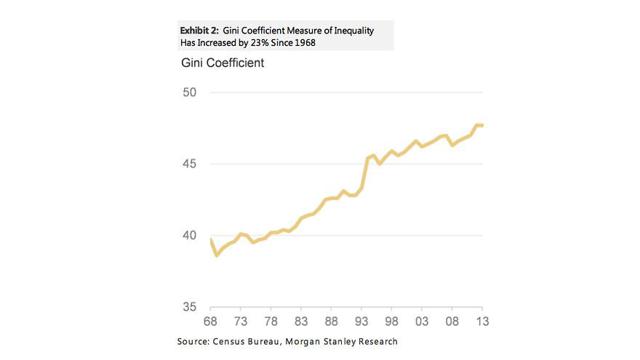
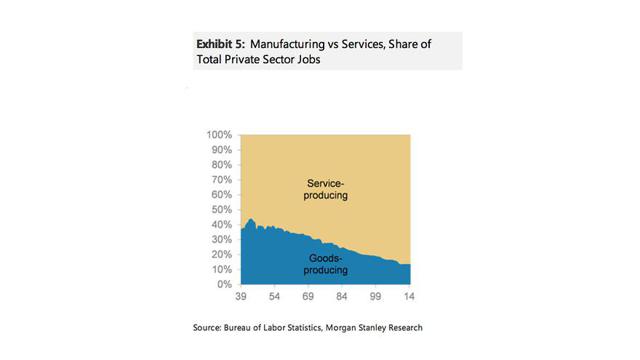
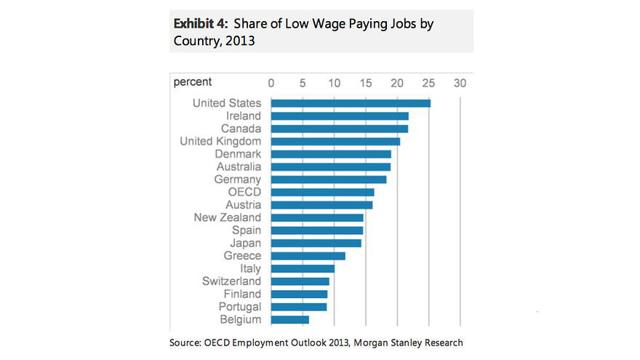
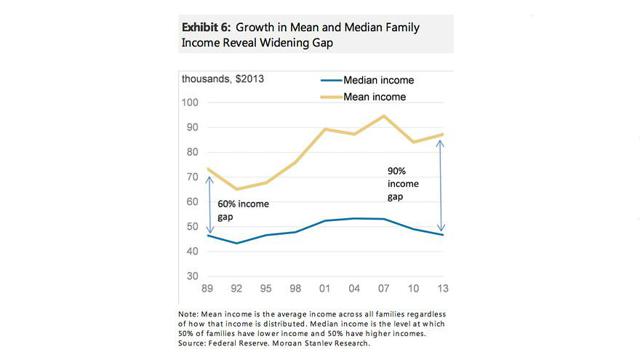
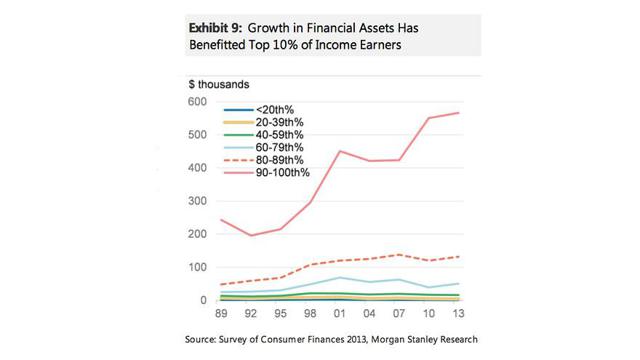

Comments